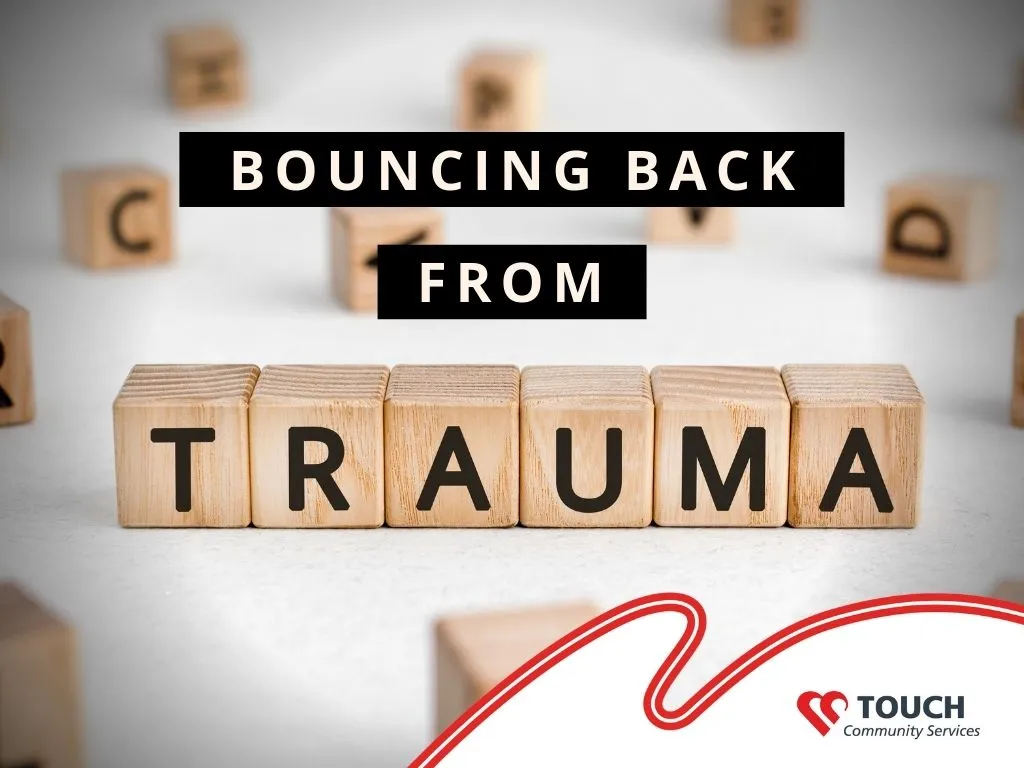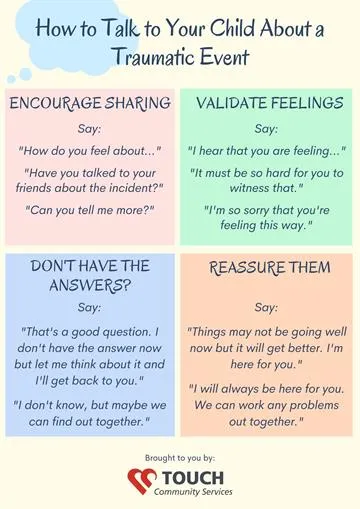Bouncing Back From Trauma

Recent news on the tragedy at River Valley High School has shocked the nation, leaving many with unanswered questions and feelings of disbelief, anger, grief, confusion, and fear.
The impact of the incident is apparent. Within a day of the news being published, the counsellors at TOUCH received multiple calls from concerned parents and youths seeking support for themselves, their loved ones, and their children. 50% of the calls received on TOUCH’s helpline – TOUCHline – that day were related to the incident.
While most adults are better able to process traumatic events and move on, the same cannot be said for children or youths. A traumatic incident, such as this one, can affect younger ones mentally and emotionally.
In this article, TOUCH Mental Wellness sheds light on the topic of trauma and how we can address it appropriately.
UNDERSTANDING TRAUMA
Trauma is an emotional response to deeply distressing and stressful events such as a serious accident, sudden death of someone you know or love, physical or sexual abuse, or witnessing domestic or community violence.Immediately after a traumatic event, one could be in denial or feel shocked, scared, guilty, angry, helpless, or numb.
Depending on the severity of the trauma and the resilience of the affected individual, some may be able to process the experience, cope with their emotions, and emerge from the trying period stronger than before.
Others, often the younger ones, may struggle to come to terms with what has happened. For this group, the consequences can be dire if their trauma is not addressed in an appropriate and timely manner.
CONSEQUENCES OF UNADDRESSED TRAUMA
When a traumatic event is left unaddressed and the emotions are too overwhelming for the affected individual to cope with, one may develop symptoms in response to trauma reminders (cues that remind them of the traumatic experience). Such symptoms include:- feeling sadness, fear or anxiety
- overreacting
- avoidance of trauma reminders (e.g. places, smells, people, sounds, objects etc)
- sudden change in behaviour
According to The National Child Traumatic Stress Network in the United States, for children, traumatic experiences can initiate strong emotions and physical reactions that can persist long after the event. In addition to the symptoms listed above, children are also likely to experience physiological reactions such as heart pounding, vomiting, or loss of bowel or bladder control.[1]
If the symptoms persist for weeks or even months and there is no intervention, traumatised individuals may develop post-traumatic stress disorder (PTSD) or other mental health conditions, such as depression and anxiety. Self-harm behaviours or suicidal thoughts/attempts have also been observed in some severe cases.
HOW TO MANAGE TRAUMA
While a traumatic event may leave you feeling overwhelmed and paralysed with fear or grief, there are things you can do to overcome it:- Acknowledge your feelings and thoughts related to the traumatic event
- Recognise that you cannot control everything that has happened
- Share your feelings and thoughts with your family and close friends
- Give yourself some time and space to process the event
- Practice some relaxation exercises to distract and calm yourself down, if necessary
If you notice any changes in your mood, behaviour or thoughts, for more than two weeks, do seek professional help.
ADDRESSING YOUR CHILD’S TRAUMA
For parents, if your child has experienced or witnessed a distressing event, you need to be intentional in talking to them to help them process the event and their feelings. Here is how you can help your child manage trauma:
- Pick a quiet and comfortable place to have a conversation with your child. Children can better share their thoughts and feelings after a trauma when they feel safe and at ease.
- Practise active listening and acknowledge your child’s feelings and thoughts in a non-judgemental manner.
- Discuss what happened and share information openly with your child
- Practice relaxation exercises, such as deep breathing, with your child
- Maintain routine activities for your child and encourage them to play and interact with their friends
- Understand that different children react to trauma differently
- Watch out for any mood or behaviour changes in your children
- Seek professional help, if necessary
HOW TO TALK TO YOUR CHILD ABOUT TRAUMATIC EVENTS
When talking with your child, adopt a calm tone and encourage sharing by asking questions like “How do you feel about what happened?”, “Have you talked to your friends about what happened?” or “Can you tell me more?”Use phrases like “I hear that you are feeling scared…”, “It must be difficult for you to witness that…”, “I’m so sorry that you feel that way” to display empathy and show your child that their feelings are validated.
Be open to any questions they ask. You may not have all the answers and that is okay! You may acknowledge such questions by saying, “That is a good question. I don’t have the answer now but let me think about it and I will get back to you.” or “I don’t know, but maybe we can find out together.”
Lastly, share your thoughts and feelings on the matter with your child and reassure them that things will get better and that you will always be there for them.

LEAD BY EXAMPLE
Children’s level of development and resilience, as well as the amount of emotional support they receive from their parents, play a huge role in determining how they respond to traumatic events. The younger the child, the more they model after their parents on how to cope with stress and trauma.So, parents, always remember to lead by example – be kind to yourself, process stressors in your life in a healthy way, practise self-care, and talk to someone or seek help when needed.
Got a question on dealing with trauma? Drop us an email at mentalhealth@touch.org.sg or call the TOUCHline at 1800 377 2252 (Mon-Fri, 9am-6pm) to speak with a trained counsellor. You may also follow @doyoumind on Instagram or @wellnessbytouch on TikTok for useful wellness-related content and updates.
TOUCH Mental Wellness (TMW) runs personalised therapy and counselling programmes to empower individuals to rise above their circumstances.
An advocate of mental wellness, TMW has been organising mental wellness awareness mass runs, talks and workshops since 2015. It works closely with corporations to conduct mental wellness talks with an aim of equipping employees with handles to cope with stress and help them build resilience. It also specialises in mental wellness awareness and educational programmes for schools.


